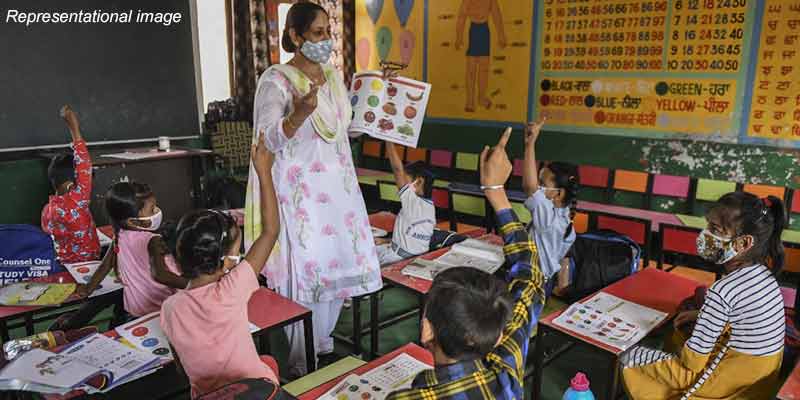- India
- Sep 13
NCERT asks schools to set up mental health advisory panel
• Setting up of a mental health advisory panel, school based mental health programme and pedagogical support to ensure mental well-being of students and engaging parents are among the guidelines issued by NCERT for schools.
• The guidelines for ‘Early identification and intervention for mental health problems in school going children and adolescents’ have been released by the National Council of Educational Research and Training (NCERT) following a mental health survey among school children.
• The report cited exams, results and peer pressure among major factors for stress and anxiety among school students.
Mental well-being is interlinked with all aspects of health
• The National Education Policy 2020 emphasizes students’ mental health and well-being in order to provide holistic development. It also instils in students qualities and life skills that aid in their growth, self preservation and sustainable development.
• Students’ mental health and well-being are known as an important precursor for ensuring optimal performance, both, in and outside school life.
• Childhood and adolescence (the stages of development, which are majorly spent in school) are critical periods when students develop a long-term mindset towards personal well-being and lifestyle choices.
• The social and emotional skills, knowledge and behaviours that students learn both inside the classroom as well as in other spaces in the school, help them build capacities of adaptability, adjustment and resilience and sets the pattern for how they will manage their physical and mental health throughout their lives.
• Strong, supportive and trusting relationships, at home and also in school, provide students with the emotional resources to step out of their ‘comfort zone’ and explore new ideas, engage with understanding varied perspectives and ways of thinking, which are foundational for strengthening one’s mental health and well-being and thus ensuring holistic development among students.
• It is important to understand that mental well-being is interlinked with all aspects of health—physical, social, emotional and compromising on any of the aspects necessarily has an impact on the rest.
• The World Health Organisation (WHO) European Ministerial Conference on Mental Health in 2005, endorsed the statement “No health without mental health”. Endorsement of this statement reiterates that the role of mental health is intrinsic and indispensable. Mental health is a state of well-being in which a person is able to cope with the stresses of daily life, continue to be productive and contributes to their community.
• During the school years, as the students move through different stages of development and experience the changes and challenges specific to their respective stage of development, an educational viewpoint demands that the findings of the survey are seen as ‘differences’ among students and not ‘deficits’ in students, especially in view of NEP, 2020 vision for an inclusive education.
• Understanding students’ concerns in the context of their course of development is imperative to take pro-active measures and to plan psycho-educational interventions to facilitate students to maximise their potential.
• The COVID-19 pandemic impacted different aspects of life in several spheres, resulting in changes in routine, lifestyle and the ways in which we interact with others.
• Closure of educational institutions throughout the country due to the unprecedented developments caused by the pandemic created a situation where students across the country experienced socio-emotional turmoil, as they were worried about the uncertainties lingering around studies and career opportunities in the future.
• Even though efforts were being made to provide instructional inputs through online mode, there was an absence of real classroom interaction, support of peer groups and joyful time spent in the school environment. Families, teachers and school authorities also expressed concerns regarding the issues faced by students.
Key points of NCERT guidelines:
• Schools generally are seen as spaces where communities of learners have been expected to develop in a safe and secure environment. School management, principal, teachers, other staff, and students all spend around one-third of a day and around 220 days in a year in schools across the states and UTs in India. For residential schools, the time spent by a student in the school community is even more. Therefore, it is the school’s responsibility to ensure the safety, security, health, and well-being of all children in schools and hostels.
• Every school or groups of schools should establish a mental health advisory panel. It should be chaired by the principal and have teachers, parents, students and alumni as members. It will create awareness, and also plan and enforce an age and gender appropriate annual school mental health programme.
• The schools should have a provision for identifying behaviour, substance use and self-harm, depression, and developmental concerns, provide first aid and make appropriate referrals.
• Most of the time mental health issues emerge at an early stage of life as half of all mental health conditions emerge by the time individuals are 14 years old and three-quarters by the age of 25. Apart from families and parents, teachers need to be informed about early flag signs as they too are the primary caregivers.
• Teachers must be trained in identifying early signs in students for attachment issues, separation anxiety, school refusal, communication issues, anxiety patterns, depressive states, conduct related issues, excessive internet use, hyperactivity, intellectual disability, and learning disabilities.
• Teachers should talk about bullying cases in class and empower students by educating them regarding bullying. They should provide a confidential way for students to report any incident which is of concern to them.
Manorama Yearbook app is now available on Google Play Store and iOS App Store


